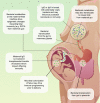Influence of maternal microbiota during pregnancy on infant immunity
- PMID: 31121057
- PMCID: PMC6718277
- DOI: 10.1111/cei.13331
Influence of maternal microbiota during pregnancy on infant immunity
Abstract
Microbiota from various maternal sites, including the gut, vagina and breast milk, are known to influence colonization in infants. However, emerging evidence suggests that these sites may exert their influence prior to delivery, in turn influencing fetal immune development. The dogma of a sterile womb continues to be challenged. Regardless, there is convincing evidence that the composition of the maternal gut prior to delivery influences neonatal immunity. Therefore, while the presence and function of placental microbiome is not clear, there is consensus that the gut microbiota during pregnancy is a critical determinant of offspring health. Data supporting the notion of bacterial translocation from the maternal gut to extra-intestinal sites during pregnancy are emerging, and potentially explain the presence of bacteria in breast milk. Much evidence suggests that the maternal gut microbiota during pregnancy potentially determines the development of atopy and autoimmune phenotypes in offspring. Here, we highlight the role of the maternal microbiota prior to delivery on infant immunity and predisposition to diseases. Moreover, we discuss potential mechanisms that underlie this phenomenon.
Keywords: infant immunity; microbiota; pregnancy.
© 2019 British Society for Immunology.
Figures


Similar articles
-
Disruption of maternal gut microbiota during gestation alters offspring microbiota and immunity.Microbiome. 2018 Jul 7;6(1):124. doi: 10.1186/s40168-018-0511-7. Microbiome. 2018. PMID: 29981583 Free PMC article.
-
Maternal and infant factors that shape neonatal gut colonization by bacteria.Expert Rev Gastroenterol Hepatol. 2020 Aug;14(8):651-664. doi: 10.1080/17474124.2020.1784725. Epub 2020 Jun 30. Expert Rev Gastroenterol Hepatol. 2020. PMID: 32552141 Review.
-
Factors affecting early-life intestinal microbiota development.Nutrition. 2020 Oct;78:110812. doi: 10.1016/j.nut.2020.110812. Epub 2020 Mar 25. Nutrition. 2020. PMID: 32464473 Review.
-
How uterine microbiota might be responsible for a receptive, fertile endometrium.Hum Reprod Update. 2018 Jul 1;24(4):393-415. doi: 10.1093/humupd/dmy012. Hum Reprod Update. 2018. PMID: 29668899 Review.
-
Women and Their Microbes: The Unexpected Friendship.Trends Microbiol. 2018 Jan;26(1):16-32. doi: 10.1016/j.tim.2017.07.008. Epub 2017 Aug 23. Trends Microbiol. 2018. PMID: 28844447 Review.
Cited by
-
Fetal growth restriction induced by maternal gal-3 deficiency is associated with altered gut-placenta axis.Cell Death Dis. 2024 Aug 8;15(8):575. doi: 10.1038/s41419-024-06962-6. Cell Death Dis. 2024. PMID: 39117607 Free PMC article.
-
Microbial composition of egg component and its association with hatchability of laying hens.Front Microbiol. 2022 Oct 20;13:943097. doi: 10.3389/fmicb.2022.943097. eCollection 2022. Front Microbiol. 2022. PMID: 36338054 Free PMC article.
-
Intrauterine Shaping of Fetal Microbiota.J Clin Med. 2024 Sep 9;13(17):5331. doi: 10.3390/jcm13175331. J Clin Med. 2024. PMID: 39274545 Free PMC article. Review.
-
Linking Migraine to Gut Dysbiosis and Chronic Non-Communicable Diseases.Nutrients. 2023 Oct 11;15(20):4327. doi: 10.3390/nu15204327. Nutrients. 2023. PMID: 37892403 Free PMC article. Review.
-
Preconception helminth infection alters offspring microbiota and immune subsets in a mouse model.Parasite Immunol. 2020 Sep;42(9):e12721. doi: 10.1111/pim.12721. Epub 2020 May 3. Parasite Immunol. 2020. PMID: 32277499 Free PMC article.
References
-
- Mackie RI, Sghir A, Gaskins HR. Developmental microbial ecology of the neonatal gastrointestinal tract. Am J Clin Nutr 1999; 69:1035S–S1045. - PubMed
Publication types
MeSH terms
LinkOut - more resources
Full Text Sources

